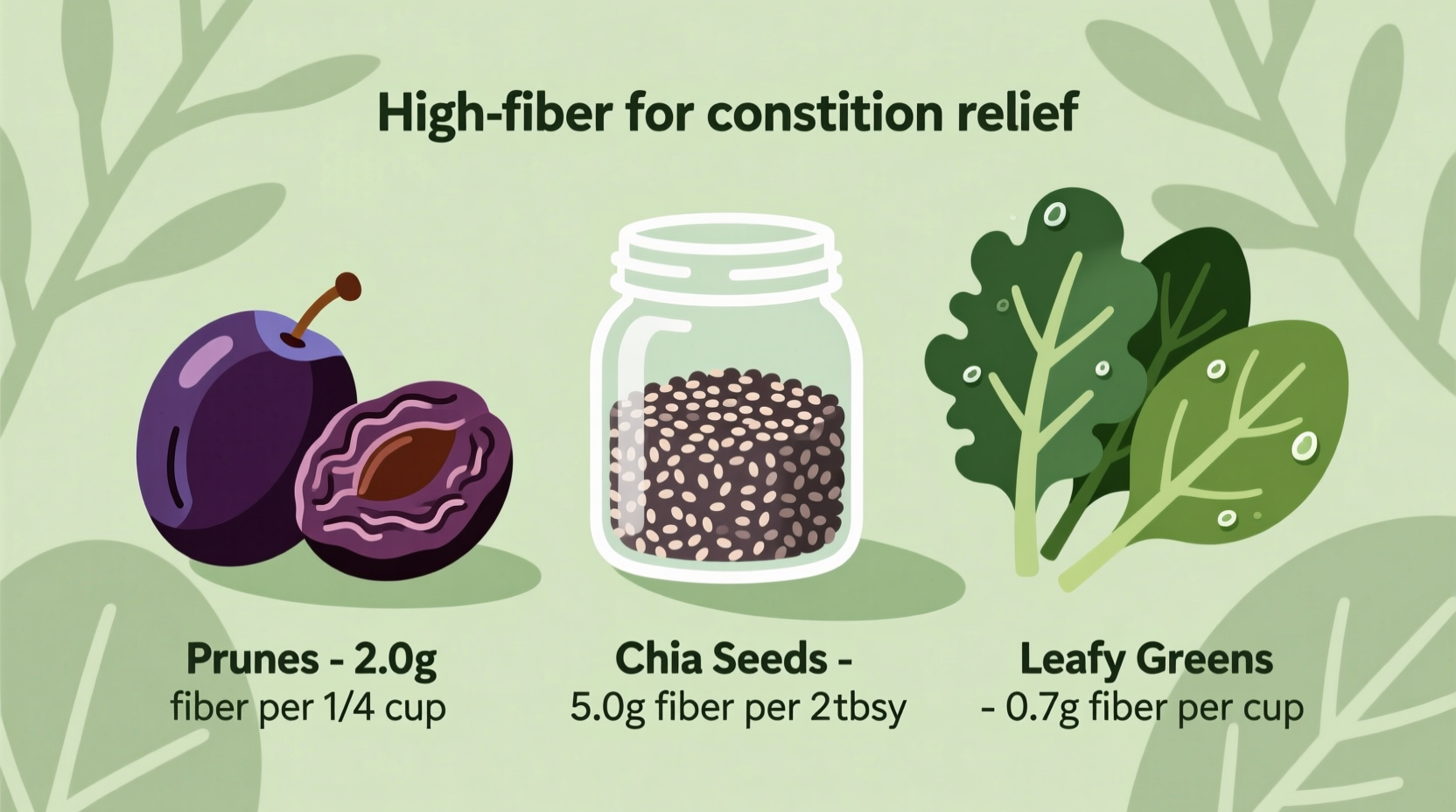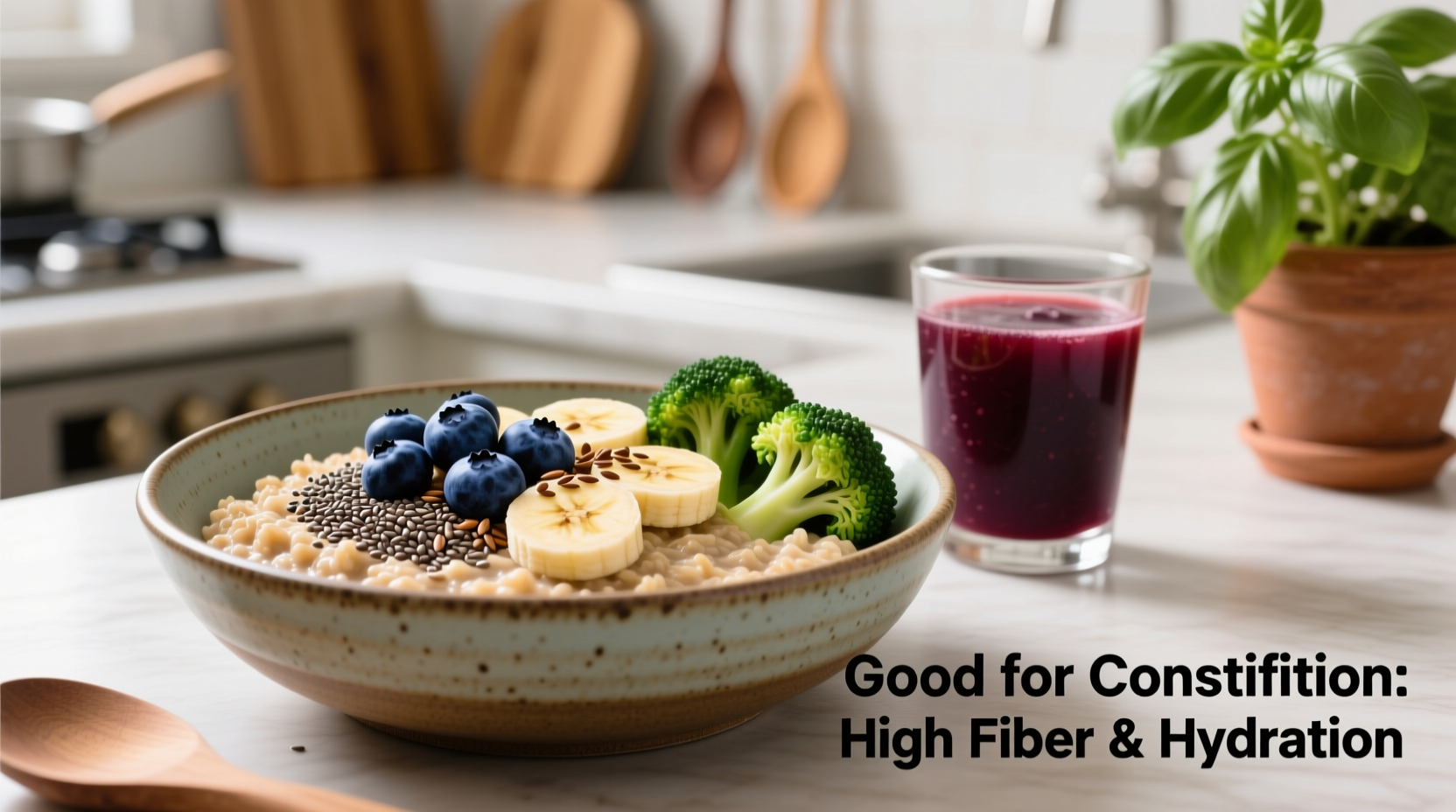Constipation affects nearly 16% of adults worldwide, yet many suffer in silence rather than seeking dietary solutions. Understanding which foods genuinely help—and how to incorporate them properly—can transform your digestive health within days. This guide delivers evidence-based recommendations from nutrition science, not anecdotal advice.
Why Certain Foods Relieve Constipation
Fiber is your digestive system's best friend, but not all fiber works the same way. Soluble fiber absorbs water to form a gel-like substance that softens stool, while insoluble fiber adds bulk and speeds transit time. The most effective constipation-relieving foods contain both types in optimal ratios.
According to the National Institute of Diabetes and Digestive and Kidney Diseases, adults need 22-34 grams of fiber daily, yet most consume only 15 grams. Gradually increasing fiber intake while drinking adequate water creates the perfect environment for regular bowel movements.
Top 7 Constipation-Relieving Foods and How to Use Them
| Food | Fiber per Serving | Key Benefits | Best Consumption Method |
|---|---|---|---|
| Prunes (dried plums) | 7.1g per 1/2 cup | Natural sorbitol content draws water into colon | Eat 3-4 daily or drink 4-8oz prune juice |
| Chia seeds | 10g per 2 tbsp | Expands 12x in liquid, creating natural bulk | Soak in water 15min before consuming |
| Leafy greens | 4g per 2 cups raw | Magnesium content stimulates intestinal nerves | Add to smoothies or sauté with garlic |
| Legumes | 12g per 1/2 cup cooked | Resistant starch feeds beneficial gut bacteria | Rinse thoroughly to reduce gas production |
Prunes: Nature's Laxative
Multiple studies, including research published in Alimentary Pharmacology & Therapeutics, confirm prunes outperform psyllium fiber supplements for constipation relief. The combination of fiber (7g per serving), sorbitol (a natural sugar alcohol), and dihydrophenylisatin compounds creates a triple-action effect on the digestive system.
Chia Seeds: The Hydration Multiplier
Chia seeds absorb up to 12 times their weight in water, forming a gel that softens stool while adding bulk. The National Institutes of Health notes that chia's soluble-to-insoluble fiber ratio (40:60) perfectly balances stool consistency. For best results, soak 1 tablespoon in 8 ounces of water for 15 minutes before drinking.
Leafy Greens: Magnesium Powerhouses
Spinach, kale, and Swiss chard contain significant magnesium—240mg per cooked cup—which relaxes intestinal muscles and draws water into the colon. A CDC analysis found adults with adequate magnesium intake were 37% less likely to experience chronic constipation.

Avoid These Common Mistakes
Many people worsen constipation despite eating "healthy" foods. These context boundaries determine whether your dietary approach succeeds or fails:
- Rapid fiber increase: Jumping from 15g to 30g daily causes bloating. Increase by 5g every 3-4 days.
- Insufficient water: Fiber needs water to work. Drink 1.5-2L daily when increasing fiber.
- Over-reliance on supplements: Whole foods provide additional nutrients that isolated fiber lacks.
When to Expect Results and When to Seek Help
Most people experience relief within 24-72 hours of implementing these dietary changes. The American Gastroenterological Association outlines this typical timeline:
- 24 hours: Increased water intake shows initial softening effects
- 48 hours: Prunes or chia seeds typically produce results
- 72 hours: Full fiber adjustment shows consistent improvement
If constipation persists beyond 7 days despite dietary changes, or if you experience severe pain, blood in stool, or unexplained weight loss, consult a healthcare provider immediately. Chronic constipation could indicate underlying conditions requiring medical evaluation.
Sample 3-Day Constipation Relief Plan
Implement these realistic meal plans without drastic lifestyle changes:
Day 1
- Breakfast: Oatmeal with 1 tbsp chia seeds and sliced pear
- Lunch: Large spinach salad with chickpeas and avocado
- Dinner: Baked salmon with roasted Brussels sprouts and quinoa
Day 2
- Breakfast: Smoothie with kale, banana, flaxseed, and almond milk
- Lunch: Lentil soup with whole grain bread
- Dinner: Stir-fried broccoli and tofu with brown rice
Final Considerations
While dietary changes work for most occasional constipation cases, remember that individual responses vary. Some people with irritable bowel syndrome (IBS) may need to modify high-FODMAP foods like certain legumes. Always introduce new foods gradually and track your body's response. The most sustainable approach combines high-fiber foods with adequate hydration and regular physical activity.
How quickly do prunes work for constipation?
Most people experience relief within 6-12 hours after consuming 3-4 prunes or 4-8 ounces of prune juice. The sorbitol content begins drawing water into the colon within 30 minutes of consumption.
Can too much fiber make constipation worse?
Yes, abruptly increasing fiber without adequate water can worsen constipation. The digestive system needs time to adjust—increase fiber by no more than 5 grams every 3-4 days while drinking 1.5-2 liters of water daily.
Are bananas good for constipation?
Ripe bananas (yellow with brown spots) contain 3g of fiber per medium fruit and can help, but unripe (green) bananas contain resistant starch that may worsen constipation. For relief, choose fully ripe bananas.
How much water should I drink with high-fiber foods?
For every 5 grams of additional fiber, drink at least 8 ounces (240ml) of water. When significantly increasing fiber intake, aim for 1.5-2 liters of water daily to prevent stool from becoming too hard.
When should I see a doctor for constipation?
Consult a healthcare provider if constipation lasts longer than 7 days despite dietary changes, or if you experience severe abdominal pain, blood in stool, unexplained weight loss, or sudden changes in bowel habits lasting more than 3 weeks.











 浙公网安备
33010002000092号
浙公网安备
33010002000092号 浙B2-20120091-4
浙B2-20120091-4